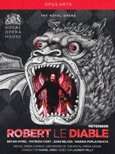|
Back
09/30/2013
Giacomo Meyerbeer: Robert le Diable
Bryan Hymel (Robert), John Relyea (Bertram), Marina Poplavskaya (Alice), Patrizia Ciofi (Isabelle), Jean-François Borras (Raimbaut), Nicolas Courjal (Alberti), David Butt Philip (First Chevalier, Master of Ceremonies), Pablo Bemsch (Second Chevalier, Herald), Ashley Riches (Third Chevalier, Prince of Granada), Jihoon Kim (Fourth Chevalier, Priest), Dusica Bijelic (Lady-in-waiting to Isabelle), Chorus of the Royal Opera House, Renato Balsadonna (Chorus Director), Orchestra of the Royal Opera House, Peter Manning (Concert Master), Daniel Oren (Conductor), Laurent Pelly (Director, Set and Costume Designer), Chantal Thomas (Set Designer), Duane Schuler (Lighting Designer), Lionel Hoche (Choreographer), Claudio Cavallari (Video Designer)
Recorded at the Royal Opera House, Covent Garden (December 15, 2012) – 222’ (including bonus)
Opus Arte #OA 1106 D (Distributed by Naxos of America) – Booklet in English, French and German – Subtitles in English, French, German, Japanese and Korean

   
Following the successful premieres of Auber’s La Muette de Portici (1828) and Rossini’s Guillaume Tell (1829), Giacomo Meyerbeer felt his energies would be best served in the arena of French grand opera. Robert le Diable was Meyerbeer’s first work slated for the Paris Opéra. An immediate success when first presented on November 21, 1831, the opera was held in repertoire for the remainder of the 19th century. Past this time, however, Meyerbeer’s works were moved aside and virtually untouched by opera companies in part due to costly production demands and taxing vocal requisites. But Meyerbeer’s works are increasingly being revisited, holding great interest in the classical music world due to his highly persuasive innovations that influenced other composers at this time.
To many Meyerbeer is synonymous with “heavy”: many of his works (if not the majority) were neatly constructed to comply with Paris’ five act punctiliousness. If one feels a weighty construct in Robert le Diable, take another look, for French operatic and theatrical director Laurent Pelly brings a cavalcade of whimsical, cartoonish imagery to the British stage in this rare recording under the Opus Arte label. Pelly even admits discovering amazing insights of the German-born composer whose musical ideas greatly affected writings of others, namely Berlioz, Offenbach and Gounod. This interpretation is highly visual, engaging, eye catching and infectious from the moment Daniel Oren raises his baton on the Royal Opera House Orchestra.
Robert no doubt is melodramatic in nature, and Pelly deals with the broad issue of the Devil and temptation from many angles: comical, quasi-bawdy, mildly-terrifying and certainly dramatic. Pelly, who takes charge of costuming, has an impression of the 1920s (i.e. Robert and Bertram) (think of Bartlett Sher’s 2009 Metropolitan Opera production of Les Contes d’Hoffmann) while the predominate force of cast members fall cleanly into Meyerbeer’s originally intentioned 13th century fairytale Cinderella-expectant attire. Textured plastic, coming in the forms of colorful horses, latticed gazebo and checkered tablecloths, gives it a dash of contemporary edging. Even a bit of M.C. Escher’s woodblock technique seeps into Pelly’s sets in Acts III and V.
Robert le Diable requires four strong voices in the opera’s principal roles, and while most of the singers encounter an occasional blip along the way, the acting and singing is absolutely top-notch. After last year’s landmark display as Enée in The Met’s production of Les Troyens, Bryan Hymel assumes the title role with energy and enthusiasm, his voice radiant and precise. His “Sicilienne” is bubbly and burnished while being surrounded by a cadre of Norman knights (complete with chain mail) who act more like a combination of Blue Man Group, Buzz Lightyear and Monty Python’s knights.
John Relyea has his challenges in the music of Bertram that requires a dramatic yet lyrical baritone, and even though the character’s notes travel between a low E-flat to a high F-sharp that encompasses two plus octaves, he still has the stature, masculinity and delivery to make him one of the best Devils in the operatic kingdom. Patrizia Ciofi is a delight to listen to, and she is “neat as a pin.” She delves into several difficult stretches with gusto, and she has unblemished meticulousness especially during Act II’s concluding “La trompette guerrière.” The petite soprano surprisingly has a steely power behind her notes, though some of them are a bit too low thereby losing some intensity. Ciofi is a lightened Annick Massis, Massis an established and credentialed Meyerbeerian artist.
Benevolence reaches into the shoes of Alice, foster sister of Robert, which is beautifully displayed through the talents of Marina Poplavskaya featuring some incredibly controlled breathing in order to sustain long legatos. Jean-François Borras’ Raimbaut, sings with a buttery lining and handles his tricky reaches in Act III’s opening “Récitatif” (“Du rendez-vous voici l’heureux instant”) with a restrained, comedic flair.
Lionel Hoche spreads out a nice variety of choreography in each act, but the Nuns’ Ballet sequence is a bit offensive and abstract which he even describes as being a bit “perverted.” No traditional ballet here, it’s more like an Orchesis contortionist reunion. Nonetheless, Hoche does a great job in keeping characters and choruses moving around the stage dismissing the potential for a lazy eye.
One who fascinates with the world of Meyerbeer will definitely see his influences over other composers in his time: the “Ouverture” unveils anticipated tragic chords from Herman Severin Løvenskiold’s ballet music for La Sylphide (a direct connection with the Nuns’ Ballet in Act III) and the first violins’ introductory melodic lines bring to mind many of Auber’s own “Ouvertures.” In Act II Isabelle sings her lamenting air, “En vain j’espére”, that exhibits the same verve found in Stéphano’s air, “Que fais-tu, blanche tourterelle”, from Gounod’s Roméo et Juliette. Daniel Oren’s orchestra plays with fine instrumental diction.
Meyerbeer fans will enjoy having this collection for their bookshelves. Even if one is tentative toward Giacomo Meyerbeer, please reconsider. Robert le Diable contains a multitude of marvelous passages, beautiful arias and ensembles that fill the theater with vitality. One can be optimistic that future Meyerbeer recordings will be forthcoming in the years to come. Highly recommended.
Christie Grimstad
|